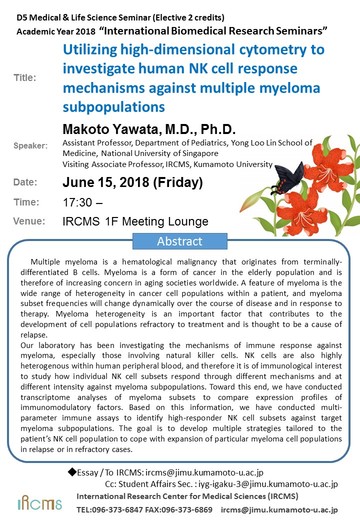- HOME
- News & Events
- [June 15]*D5 Medical & Life Science Seminar*
News & Events
[June 15]*D5 Medical & Life Science Seminar*
May 23 2018
The "D5 Medical & Life Science Seminar" course will be offered by International Research Center for Medical Sciences (IRCMS). It will run from May 2018 to March 2019, with lectures given by scientists affiliated or collaborated with the IRCMS. The course theme for this academic year is "Basic research for understanding disease mechanisms". The lectures will be given once a month, in English, and by leading scientists in the relevant research field. Students will be taught: 1) how normal physiological functions are maintained in human hematopoietic, vascular, immune, reproductive and nervous tissues and organs; 2) how abnormalities in these systems (e.g., cancer) are studied using experimental models; 3) cutting-edge technologies (including single cell level imaging and omics analysis) used for mechanistic understanding of these abnormalities; 4) efforts and progresses in finding cure for human diseases associated with these abnormalities; and 5) importance of understanding disease mechanisms using
Date: June 15, 2018 (Fri)
Time: 17:30 -
Venue: IRCMS 1F Meeting Lounge
Speaker: Makoto Yawata, M.D., Ph.D.
Abstract:
Multiple myeloma is a hematological malignancy that originates from terminally-differentiated B cells. Myeloma is a form of cancer in the elderly population and is therefore of increasing concern in aging societies worldwide. A feature of myeloma is the wide range of heterogeneity in cancer cell populations within a patient, and myeloma subset frequencies will change dynamically over the course of disease and in response to therapy. Myeloma heterogeneity is an important factor that contributes to the development of cell populations refractory to treatment and is thought to be a cause of relapse.
Our laboratory has been investigating the mechanisms of immune response against myeloma, especially those involving natural killer cells. NK cells are also highly heterogenous within human peripheral blood, and therefore it is of immunological interest to study how individual NK cell subsets respond through different mechanisms and at different intensity against myeloma subpopulations. Toward this end, we have conducted transcriptome analyses of myeloma subsets to compare expression profiles of immunomodulatory factors. Based on this information, we have conducted multi-parameter immune assays to identify high-responder NK cell subsets against target myeloma subpopulations. The goal is to develop multiple strategies tailored to the patient's NK cell population to cope with expansion of particular myeloma cell populations in relapse or in refractory cases.

